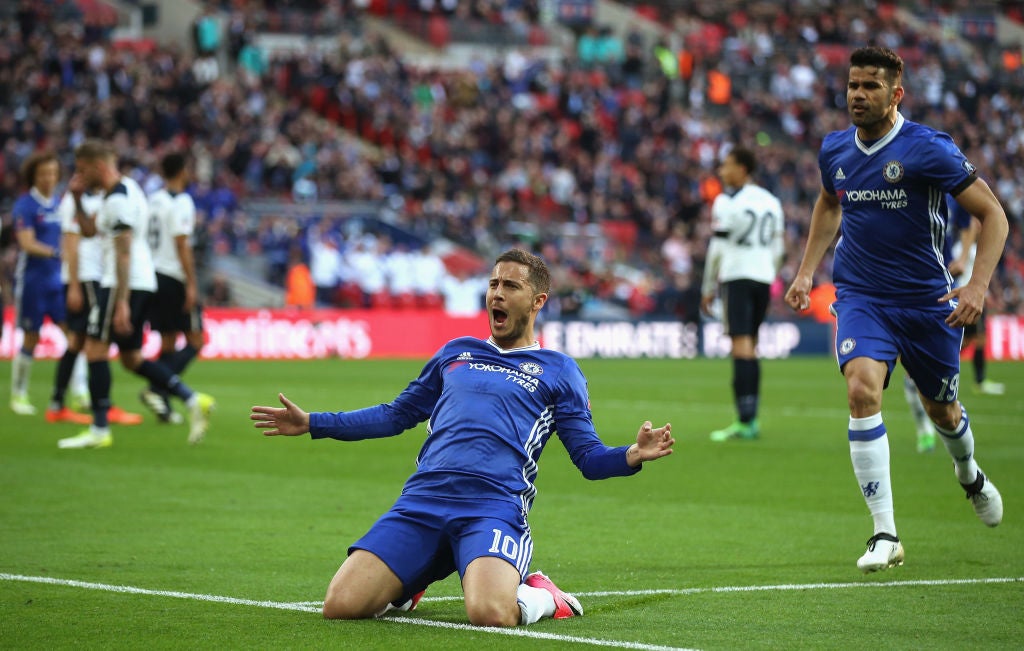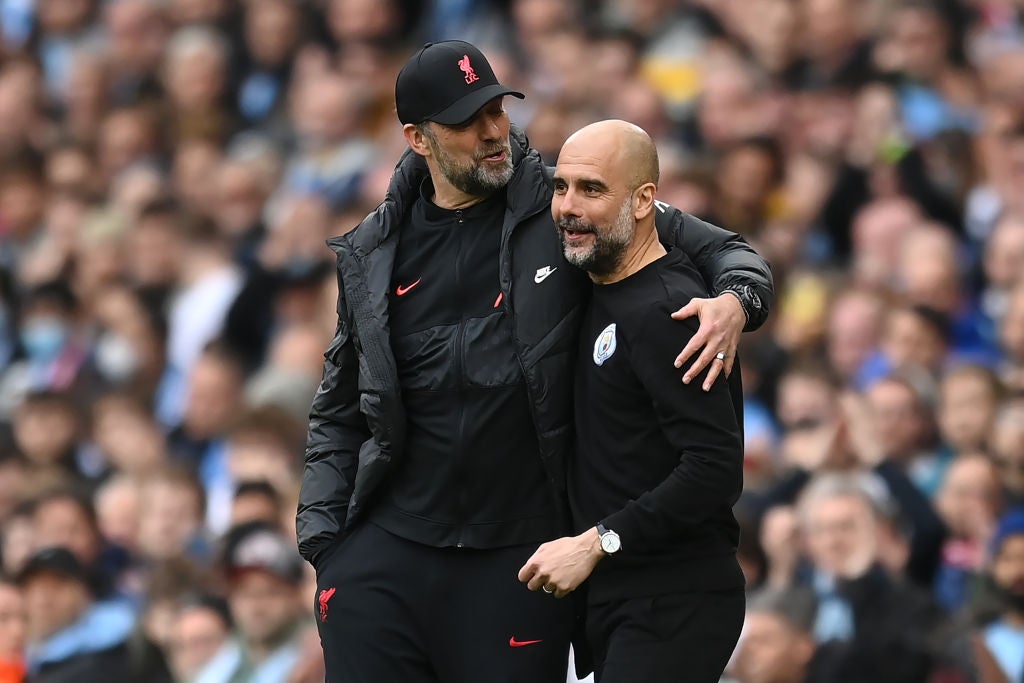
On the way back from taxing Champions League games, Jurgen Klopp and Pep Guardiola could have allowed themselves the time to relax, but that’s just not in their nature. The Manchester City manager was already on the laptop on the way home from Madrid. There was something to be figured out.
If there has been any sense that Saturday’s FA Cup semi-final is a fixture they could have really done without – a game against exactly the wrong opponents at the wrong time – it was quickly pushed back. The brief build-up has instead inspired an enthusiasm in both managers. It reminded them this is what they live for.
The very fact they have big games in such quick succession actually makes it all the better, because it brings out the best in them.
“You do one thing, they respond with another, you answer in another way,” Guardiola says in Another Way of Winning, specifically speaking about a “series” of monumental matches like this. “The guessing, the changing, the preparing, the switches during games; guessing what formation they will play, how we can surprise them too. That is what makes everything enjoyable, what gives meaning to everything.”
This, when you get right down to it, is really what elite coaches crave: the cut and thrust, the most intense circumstances for their ingenuity. That’s possibly all the more acute because Saturday’s circumstances are quite rare.
It is just the fourth time since the Second World War that the league's top two have met in an FA Cup semi-final. The competition might not mean as much as it did for some of those, and the occasion obviously doesn’t mean as much as the final, but that almost makes it more complicated.
That is because such an occasion comes at a more fraught stage of the season, surrounded by so many crucial fixtures. This build-up alone has already seen Klopp complain about the timing of a crucial league game with Newcastle United, in between legs of the Champions League semi-final against Villarreal. Even that has more significance than usual, though. It may yet set up the ultimate showdown between City and Liverpool, in the Champions League final itself. The prospect just adds more weight to Saturday’s game, and more complications.
While an event like the Champions League would be something everyone puts everything into, that isn’t quite the case with the FA Cup semi-final. It is as much about what you might give away as what you can gain.
It is why some involved figures refer to the more restrained last half-hour of Sunday’s Premier League game as a “non-aggression pact”. Both were conscious of bigger conflicts to come.
Saturday won’t really allow that.
It has to end on the day, and will consequently become an end in itself.
That is something that became apparent in the similar fixtures from the past, the circumstances of which are instructive for Saturday.
The most recent of those is not really an example, mind. Tottenham Hotspur were second behind Chelsea in 2016-17, but the latter had already stormed away at the top. The 4-2 semi-final win merely served to further illustrate they were a wealthier club with a better squad.

These concerns were absent in the 1964-65 semi-final between Manchester United and Leeds United, though. It was about pure animosity, of the rawest kind.
Looking back at that game is humorous given the commentary of the last week. The players would surely regard some of the antics of Arsenal-United 1997-2005 as “handbags”.
Not even Roy Keane and Patrick Vieira reached the depths of the first 1965 semi-final, a 0-0 at Hillsborough. It has gone down as one of the most aggressive matches of an almost lawless football era.
Jonathan Wilson’s new book on the Charltons, Two Brothers, describes it as “a miserable, scratchy affair, so violent one media outlet used the page furniture usually reserved for boxing and headlined its piece on the game a “big fight report”. When Bobby Charlton was going through on goal in one moment, he heard a voice from behind. “Clatter the little bastard!” It was his brother.
Jack Charlton and Dennis Law eventually had a fight, the latter’s shirt literally being ripped from his back. Behind them, all of Paddy Crerand, Nobby Stiles, John Giles, Norman Hunter, Billy Bremner and – above all – Bobby Collins were more than willing to mix it. Eamon Dunphy’s A Strange Kind of Glory describes Collins as “the most feared midfield player in England”, a wonderful footballer but “with a streak of malevolence in his soul”.
Somehow, only two players were booked. The media reaction was furious. The replay was all the more tense as a consequence. Leeds won 1-0 through Bremner, and were seen as having that psychological edge.
“We were gutted,” Stiles told Dunphy. “We went to Blackburn three days after the semi-final. I always wanted to play but I had no heart for it that day… I remember walking on the pitch before the match and thinking the whole season could be over today.”
It didn’t work out that way. One of the world-class players, of the vintage that really elevates these kinds of sides, inspired victory.
“Bobby [Charlton] was the one,” Stiles said. “His spirit lifted us.”
The likely absence through injury of Kevin De Bruyne may be influential in a similar way, and may even preserve him for the bigger challenges to come.
United developed a determination out of the situation, that actually saw them win all of their remaining league games until the title itself was secured. One of those victories was over Leeds, and it was almost as if Don Revie’s side had spent too much of the energy necessary to play United in the cup, losing their edge. By contrast, we’ve already had the big league meeting between City and Liverpool this year. Might Saturday influence a possible Champions League final, though?

That 1965 semi-final certainly provoked a winning relentlessness in United that is more in keeping with the modern game, and was almost unseen at the time. Six wins in a row was otherworldly stuff. Even champions slipped up a lot, and often badly. Here, the beaten semi-finalist was driven to become the victorious league champion.
It was the opposite in the most famous semi-final of all, in 1998-99. Compared to 1965, that epic replay between Arsenal and United now seems more like 2022. It was all about the football.
It certainly had more of the considerations of the modern game, as the sport fully entered a new era. United were chasing a first-ever treble, something that both City and Liverpool are now trying to emulate for the first time, with Klopp’s team also aiming for a first-ever quadruple. That meant, like now, Sir Alex Ferguson had big decisions to make – especially for the replay.
All of Dwight Yorke, Andy Cole and Ryan Giggs were “rested”, to use the Welsh winger’s quotation marks, with Teddy Sheringham, Ole Gunnar Solskjaer and Jesper Blomqvist brought in. The fact such changes still produced such a classic should be kept in mind for Saturday. Neither Guardiola nor Klopp will play full teams, but that may not prevent it from becoming a full-blooded and full-on encounter.
That is something that became apparent throughout an epic night at Villa Park in 1999. The narrative beats of the occasion were almost perfect. There was David Beckham’s curled opener, Dennis Bergkamp’s deflected equaliser, Keane’s red card, an Arsenal onslaught, Peter Schmeichel’s penalty save and then the rousing crescendo of Giggs’s winner.
Everyone at United believes that victory was essential to winning the Premier League and Champions League, as well as obviously being integral to the treble itself.
Keane called it “a pivotal moment” and, interestingly, “the kind of confirmation” that “even Manchester United needed”. Schmeichel felt defeat would have “stopped the roll we were on and then the momentum to win the league”.
“After winning such an epic,” he says in his autobiography, “we felt unstoppable”.
It meant they just stayed ahead of Arsenal in the title race.
No one was actually thinking about this amid the electricity of the occasion, though.
“Victory here and now became an end in itself,” Keane said. The semi-final might have actually been about everything else but, in the moment, it was only the purity of the match itself that mattered.
The hope is that Saturday is similar. Both managers could already feel such a thrill as they prepared.
This might well be the most “dispensable” of the trophies left. It could be precisely because of that, however, that it becomes a game to savour.







